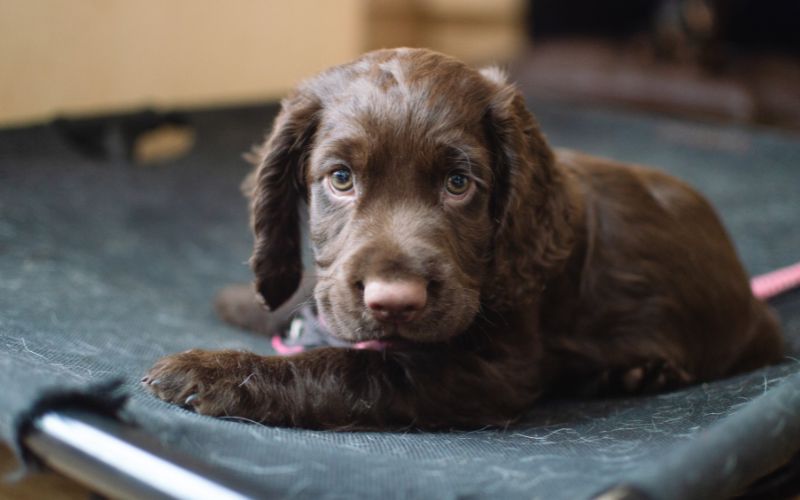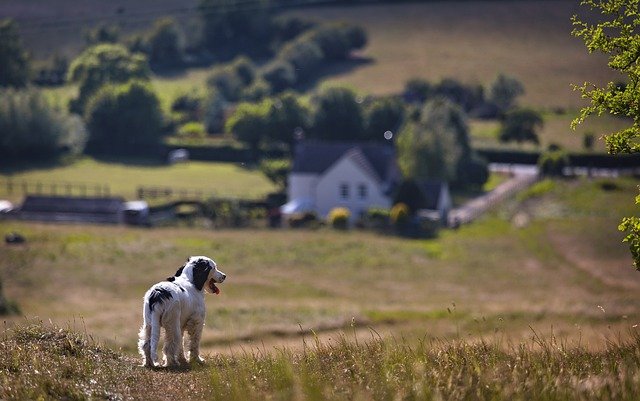Working Cocker spaniels are intelligent, active dogs that will have been bred from parents proven as working dogs.
As a working breed they are easy to train and enjoy the challenges of training and of learning new things. It is important to introduce your Cocker puppy to simple exercises while he is still a youngster and to continue with his training as he gets older, introducing interesting and challenging activities into his training schedule.
When to start training a working Cocker spaniel
The training of your spaniel should begin as soon as he comes into your home, however this will not be training as you might think of it.
Regardless of the age of your spaniel when he enters your family home he will need time to settle in and become familiar with the family routine.
Make sure that he has all of the basics to make him comfortable – a safe place to sleep, good food and a good supply of fresh water.
You can read about dog beds in my article here and find out about the best type of foods in this article.
Give your dog time to settle down and relax before you begin the basic and simple exercises that I discuss in this basic spaniel training article.
Training a working Cocker spaniel puppy
If you get your Cocker when he is a puppy then you will have the best opportunity of owning a well behaved and intelligent dog that will grow into a responsible adult and be a pleasure to be with.
You should introduce the puppy to his name and begin with simple exercises such as sitting down and coming when his name is called, house training and walking on his lead.
I have put together a comprehensive article that takes you through all of these exercises, the best way to teach your puppy and some great hints, tips and advice o help you and your spaniel.
You can read how you can train a working Cocker spaniel puppy here.

What is the best age to start gundog training?
It is easy to get carried away and excited about your spaniel training, particularly if you are going to use your Cocker as a gundog.
However, you need to be restrained and not push on too quickly with a young dog, if you do then you run the risk of taking away much of his natural ability and of introducing problems that could have been avoided.
For a working Cocker spaniel you should not begin proper gundog training before he is six months old. By this time he will have developed both physically and mentally and will be more able to cope with the demands of training.
Are male or female working Cocker spaniels easiest to train?
I have had both male and female spaniels and, to be honest, there is very little difference.
Most modern working Cocker spaniels are so soft and biddable that training is a pleasurable experience that often goes well with very few problems.
You may have heard that male spaniels can be a bit ‘harder’ than the females and, in some breeds of dogs this may be true, but, in spaniels, they are so well bred – particularly the working Cockers, that they take to training like ducks to water.
If you are trying to decide whether to get a male or female Cocker and are concerned about which would be best for training then don’t be.
Choose the dog that you like the most – that is the best place to start.
Further Reading on Cocker Spaniel Training
What is a working Cocker spaniel expected to do?
This really depends on what activities you are going to do with your Cocker. Assuming that you will be shooting or using your spaniel as a gundog, there are a few things that are needed from him:
He will need to hunt the ground, using the wind to get scent into his nose and investigate every piece of cover to find game.
Having found game, whether bird or ground game then he should not try to catch it but should flush it out so that it flies or runs away.
He should not chase after it and should remain steady.
Once the game is shot you may need a Cocker spaniel to retrieve it, often finding it himself and bringing it into hand.
He should not damage the game.
He will need to be able to find game that has been injured and which has run away, he should bring it to hand and not kill it.
Your spaniel will need to be calm, not bark or be noisy and be able to work alongside other dogs, some of which will be less well trained.
If you are considering field trials or working tests then he will need to be able to do all of the above to high standards.
You will also need to be able to handle your spaniel and give him directions.
Nimrod, my young Cocker spaniel training session
Cocker spaniel training for field trials and tests
If you are aiming to run your Cocker in field trials or working tests then you will need to invest a lot of time and effort into regular training with your dog.
Tests and trials, particularly trials, can be challenging and are no place for inexperienced dogs or handlers and you will need to practice and practice, to give both you and the dog as much skill and confidence when you finally bite the bullet and compete.
I have run in many trials and tests with spaniels and the more time that you can invest in training, the better.
If you can spend time with more experienced handlers then they can be valuable sources of knowledge, tips and advice.
Gundog societies and clubs run these competitions and often many hold training sessions or will put you in touch with handlers that can help if you ask nicely.
You can find contacts for local societies at the Kennel Club.
Training a working Cocker spaniel is not difficult.
With the right resources and providing you take your time and do not rush, you will be able to successfully train a working Cocker spaniel to a high standard.
They are intelligent dogs that love training and exercise and providing that you channel this energy in a positive, enjoyable fashion, you and your dog will both learn from each other.




